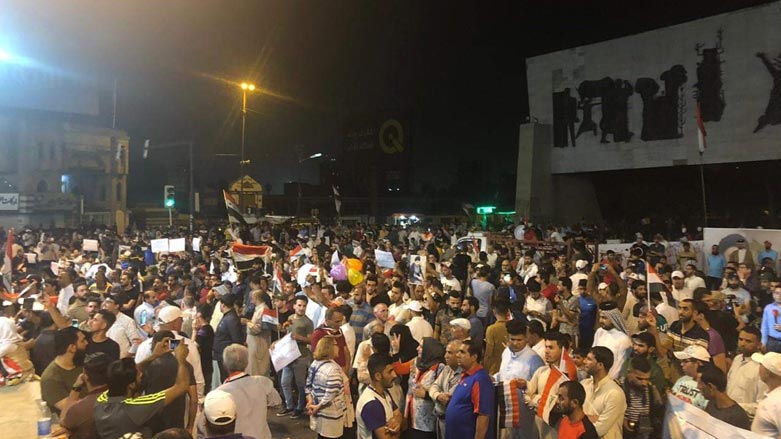Followers of Iraqi cleric hold anti-war protests as Iran-US tensions grow

ERBIL (Kurdistan 24) – Followers of influential Iraqi Shia cleric Muqtada al-Sadr on Friday launched a series of anti-war demonstrations in the capital of Baghdad and other cities to the south as tensions escalated between the US and Iraq’s eastern neighbor, Iran.
Crowds chanted, “Yes to peace… No to war!” in central Baghdad’s Tahrir Square, a popular site of Friday demonstrations. Local sources told Kurdistan 24 that security forces were deployed to the area, as is normal when protests are being held.
The demonstration comes amid concerns that Iraq could be plunged into a possible proxy conflict between arch-foes US and Iran after a notorious Iranian military commander recently called on Tehran-backed Iraqi militias to prepare for war.
Citing two intelligence sources, The Guardian reported last week that the head of the Quds force of the elite Islamic Revolutionary Guards Corps (IRGC), Qasim Soleimani, had earlier met with Iraqi militia leaders and told them to “prepare for a proxy war.” The US designated the IRGC as a foreign terrorist organization in early April.
Sadr, A long-time critic of foreign powers' intervention into Iraq’s internal affairs, has already stated his opposition to actions that could lead to conflict. “I am not for fueling war between Iran and America,” he said in a Twitter statement.
At a sit-in held in the city of Najaf the week before, security forces killed at least four people and injured 17 others, according to initial reporting. Those taking part were protesting corruption that has squandered the country’s resources and left the public enraged.
Related Article: Deadly anti-corruption protests restart in Iraq’s Najaf
The protest, like Friday's, began at the behest of Sadr, whose coalition was the winner of last year’s parliamentary elections. He had called on his supporters to surround “corrupt” business centers and “disrupt their affairs” for three days.
After the sit-in turned to violence, with fires and gunshots erupting near a local mall, Sadr quickly walked back his statement and urged his followers not to engage in violent behavior.
Beginning in the summer months of 2018, residents in the southern province of Basra staged dozens of protests that spread across much of Iraq in which they demanded improved public services, clean water, regular electricity supply, employment, and an end to widespread corruption in Iraqi government institutions.
Editing by John J. Catherine
